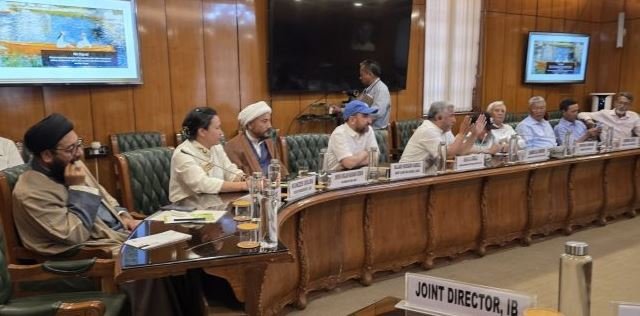JAMMU, May 27: In a significant development, the Leh Apex Body (LAB) and the Kargil Democratic Alliance (KDA) have agreed to a 15-year residency requirement for acquiring domicile status in Ladakh, effective from the year 2019. This marks a shift from their earlier demand of a 30-year timeline. However, the Union Ministry of Home Affairs (MHA) has assured both bodies that the 30-year proposal will be formally referred to the Union Law Ministry for legal scrutiny. If found viable, the results of the review will be shared during the next round of talks.
The agreement was reached during the latest High Powered Committee (HPC) meeting held in New Delhi, chaired by Union Minister of State for Home, Nityanand Rai. The meeting, which lasted over three hours, did not deliberate on the core demands of Statehood and Sixth Schedule status, but both LAB and KDA leaders were assured that another meeting would be scheduled within a month to revisit these critical issues.
Senior leaders representing the LAB and KDA—including Thupstan Chhewang, Chering Dorjay Lakruk, Nawang Rigzin Jora, and Asgar Ali Karbalai—hailed the discussions as a “major breakthrough,” particularly in resolving the long-pending domicile eligibility guidelines that had delayed recruitment to the gazetted cadre.
According to the consensus, all non-gazetted jobs in Ladakh will remain reserved for individuals possessing a valid Ladakh Resident Certificate (LRC), which functions similarly to the erstwhile State Subject in undivided Jammu and Kashmir. The leaders also disclosed that 95% of gazetted posts will now be reserved for local residents—85% under the general category and an additional 10% for those falling under the Economically Weaker Sections (EWS) from Ladakh. Only 5% of these posts will be open to individuals qualifying under the 15-year domicile rule.
Importantly, the Centre is set to formalize the establishment of Ladakh Administrative Services (LAS) and Ladakh Police Services (LPS), modeled after the JKAS and JKPS of Jammu and Kashmir. This move will finally institutionalize a dedicated recruitment system for the region’s gazetted cadre, a key demand of both the LAB and KDA. The leaders reiterated their previous decision to stay out of the DANICS and DANIPS services, noting that a significant number of JKAS and JKPS officers are currently on deputation in Ladakh due to the administrative vacuum.
On the much-debated issues of Statehood and the Sixth Schedule—two pillars of their original four-point agenda launched in 2021—the leaders maintained that they remain non-negotiable priorities but clarified that their immediate focus is on addressing the acute unemployment crisis in the region. The four-point demand includes: 1) Statehood for Ladakh, 2) Inclusion under the Sixth Schedule of the Constitution, 3) Establishment of a separate Public Service Commission for Ladakh, and 4) Allocation of two separate Parliamentary seats—one for Leh and one for Kargil.
Though the Ministry of Home Affairs had earlier dismissed the demands for Statehood and the Sixth Schedule, dialogue was reopened after widespread public agitation and a symbolic hunger strike by prominent Ladakhi activist Sonam Wangchuk. Since Ladakh was carved out as a separate Union Territory from Jammu and Kashmir on August 5, 2019, there has been a complete absence of recruitment to gazetted posts due to the lack of a defined recruitment mechanism or responsible agency.
Both LAB and KDA expressed cautious optimism following the meeting and welcomed the Union Government’s willingness to document the minutes of the HPC session—marking a first in the ongoing dialogue. The move signals growing institutional clarity and a renewed commitment by the Centre to address the region’s long-pending governance and employment challenges.
The next meeting of the HPC, anticipated within a month, is expected to further advance the discussions on domicile provisions, recruitment structures, and eventually, the political status of Ladakh.




